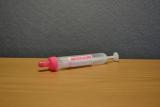Test Directory
BCR::ABL1 t(9;22)(q34;q11) Diagnostic (for suspected CML)
Containers - Adult

Red Cap Tube EDTA KE 9ml
|
Volume Range
10-15ml Peripheral blood or bone marrow specimen
Additive per Container
EDTA |
Laboratory Site
WGH
Crewe Road South
Edinburgh
EH4 2XU
Edinburgh
EH4 2XU
Telephone: 0131 537 1000